Are you interested in...
Traveling and immersing yourself in other cultures?
Learning about history and current events?
Thinking about how new technology, like artificial intelligence, will change the world?
And finding solutions to big problems like climate change and war?

Then you might be interested in a career in international affairs!
What is international affairs?

International affairs, sometimes called foreign affairs or foreign policy, refers to the many global interactions, big and small, between countries, organizations, and other actors, from drug traffickers and terrorists to CEOs and foreign aid workers.
You can work for your home country's government on foreign policy, trade, or military and defense matters.
You can work for nongovernmental organizations which study and bring to light many issues like human rights, election security, economic development, and deforestation, as well as promote change in the world.
You can also work for your hometown or city. In today's era of global challenges, local governments are taking a more active role in foreign policy.
As an international affairs professional, you can:
contribute to the safety and prosperity of your home country
solve problems that help people around the globe
build the type of world you want to live in
Whether you're driven to resolve conflicts, eliminate nuclear weapons, defend human rights and democracy, protect vulnerable populations, take action on climate change, or all this and more, there's likely a job for you!
How do I get started?
There's no one way to get your foot in the door. But you'll most likely need an undergraduate degree. This will help you develop the skills and learn the knowledge you need for a career in this field.

Education
Many people who work in this field tend to have studied political science, international relations, history, anthropology, area studies, or economics in college. But you can blaze your own career path with almost any field of study.
In today's era, engineers, computer scientists, and other people with a background in STEM are in high demand. Knowledge and skills in these fields will be critical as advances in artificial intelligence and other emerging technologies are already changing international politics as we know it.
It may be wise to consider whether you want to pursue further education for either a master's degree or even a doctorate in public policy, foreign affairs, or journalism. While not necessary, these degrees could help open doors and enable you to meet and network with future colleagues.
Any or all of these skills will be instrumental:
Critical thinking and problem-solving 🧐
Love of reading 📚
Speak one or more languages other than your own 🗣️
Adept at writing, researching, and examining different forms of evidence ✍️
Data analysis and computer skills 👩💻
Excellent communicator 📡
Able to think freely, but also good at executing decisions once they've been made 👨💼
Become an expert
It's great to know a lot about a whole lot of things, but organizations also want to hire people who are very knowledgeable on the subjects they work on.
The best advice is to learn all you can on an area you're passionate about, whether that's US military strategy, politics in China, or the foreign relations of Brazil.
How do I build a resume I can be proud of?
The more education you receive and the more books you read, the better — but nothing beats real world experience.
Here's what you can do now or plan to do, to give you a boost in the future:
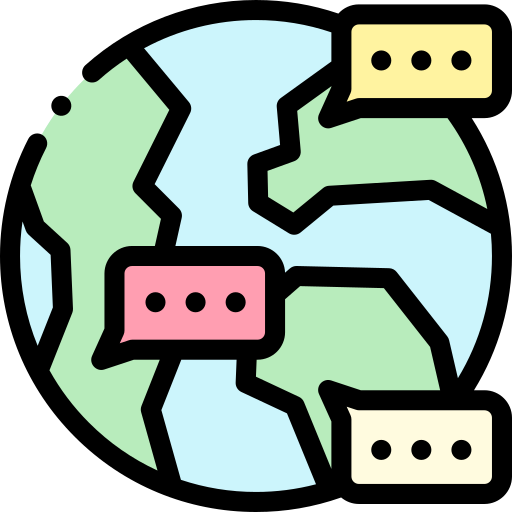
Learn a language or two, or three
Not every job will require you to speak more than one language, but if you're interested in European foreign policy, it would be best to learn a language like German, French, or Russian. If your school doesn't offer the language you want to study, try a website like Duolingo or Busuu.
Language can also mean a lot of other things. For example, If you are interested in computer science, learn to code. Or, if your interests are in nuclear weapons, get familiar with the relevant jargon.

Travel, study, and work abroad
This will help you hone your language skills and provide an opportunity to immerse yourself in other cultures and share different perspectives with the people you meet.

Volunteer with organizations and campaigns
You can volunteer abroad by teaching children and adults your native language or join organizations like the US Peace Corps. You can also volunteer at home by helping with a political campaign, assisting immigrants and refugees, or something similar.

Apply for internships
Check with your school's or college's career center for internship information. You can intern for Congress, a think tank, or any organization that will provide work experience. These are great ways to build connections, learn about job opportunities, and receive advice from those who are doing what you want to do.

Write about foreign affairs
You can only benefit from being a good writer. And the more you do it, the better you will be. In foreign affairs, there are different forms of writing that you can practice now. Learn how to draft a memo or get an op-ed published in your school or local newspaper.

Apply for scholarships, fellowships, or grants
Is there a research project you really want to do, but it requires travel? Or do you not want to pay for your education? Search for and apply to opportunities like the Fulbright Program, which will allow you to work and study abroad.

Join school clubs and organizations
You can join clubs like Model United Nations, Mock Trial, and debate to hone your ability to make compelling arguments. And to meet people who share similar interests.
Subscribe for more quick bites of learning delivered to your inbox.
Unsubscribe anytime. No spam. 🙂
This is great, but what do foreign policy jobs actually look like?
Those who work in international affairs often work for their country's government.
Things might look different depending on your country, but in the United States, you can get a sense of the different types of jobs by looking at the president's National Security Council.
Based in the White House, the National Security Council is a forum that coordinates and advises the president on national security issues. It is composed of the President's main national security advisors and cabinet members, which work in the Executive Branch.
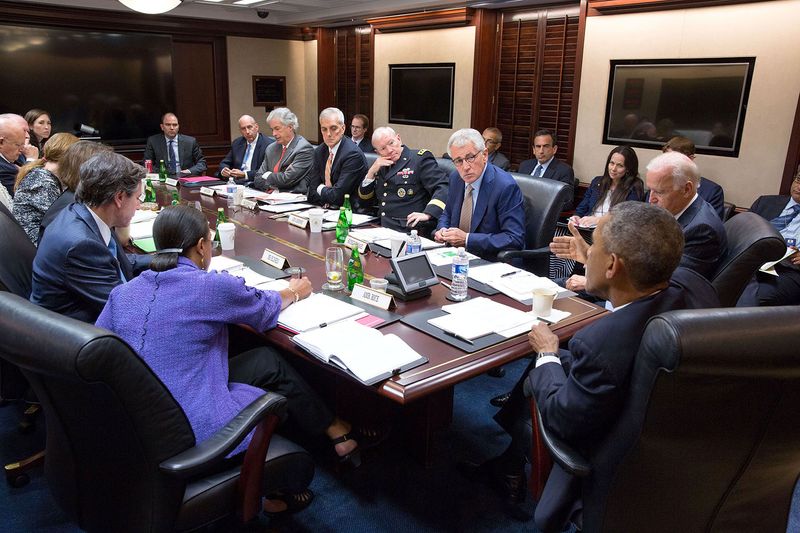
What about the National Security Council?
Let's take a look around the table at some of the members of the National Security Council, the organizations they represent, and what they do.
 Department of State
Department of State
The main department that plans and executes American foreign policy and oversees diplomats and embassies.
It's headed by the Secretary of State.
Some jobs include:
Foreign Service Officers: Based overseas, they provide support for America's embassies.
Civil Service: These include jobs that support the State Department within the United States.
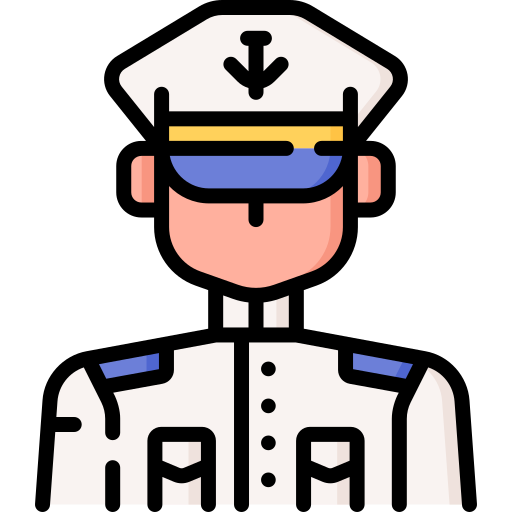 Department of Defense
Department of Defense
This department oversees the military, develops and procures weapons, and plans military strategy.
It's headed by the Secretary of Defense
Some jobs include:
Civilian: Employees who aren't in the military but work on technological, political, and weapon issues.
Service members: Armed service members who serve in a military branch overseen by the Defense Department.
 Military
Military
Composed of six branches (Army, Navy, Marines, Coast Guard, Air Force, and Space Force), the Defense Department oversees all but the Coast Guard in times of peace.
The Chairman of the Joint Chiefs of Staff advises the president on military matters.
Some jobs include:
Commissioned Officers: Officers who've usually done ROTC programs in college or attended one of the service academies
Enlisted: Most service members are enlisted. Their roles include infantry and support positions.
Reserves: They serve part-time in addition to their day-to-day jobs outside the military.
 Intelligence
Intelligence
There are seventeen intelligence agencies in the United States. These include the CIA, FBI, and NSA. Knowledge of language, technology, and culture are a few requirements.
The Director of National Intelligence advises the president.
Some fields within intelligence include:
Human intelligence: Information collection from human sources. This requires knowledge of language, politics, and culture.
Imagery intelligence: Information collected from photographs and videos, often taken from the air and space.
Signals intelligence: Information collected from communications or electronic signals.
Organizations like the United States Agency for International Development, the Department of Energy, the Department of Treasury, the Justice Department, and the United States Department of Agriculture also have positions that deal with international issues like nuclear weapons, trade, and sanctions.
What about outside the Executive Branch?
 Congress
Congress
Congress is the branch of government that provides oversight of the Executive Branch's implementation of foreign policy. The Senate also approves the President's nominations for positions like Secretaries of State and Defense.
Representatives and Senators have aides who advise them on foreign policy and defense issues. Both chambers have committees with staff who draft legislation and conduct research and analysis.
Consider pursuing staff or aide jobs in committees like:
Senate Armed Services Committee
Senate Committee on Foreign Relations
Senate Select Committee on Intelligence
House Foreign Affairs Committee
House Armed Services Committee
House Permanent Select Committee on Intelligence
Local Government
 Nowadays, more and more diplomacy occurs at the state and city levels in rural and urban areas. This is called subnational diplomacy. Pandemics, trade, migration, and climate change have shown that many global issues can significantly impact the citizens of these communities.
Nowadays, more and more diplomacy occurs at the state and city levels in rural and urban areas. This is called subnational diplomacy. Pandemics, trade, migration, and climate change have shown that many global issues can significantly impact the citizens of these communities.
Local governments ensure their communities are prepared to respond to international crises, pressure the federal government to advance a foreign policy beneficial to their citizens, and foster cultural exchange.
These are just some US cities with robust departments and agencies dedicated to international affairs. See what opportunities are available in your mayor's office.
Did you know?
What about outside the government?
There are also many opportunities outside the government in intergovernmental organizations, nongovernmental organizations, think tanks, and the private sector.
 Nongovernmental Organizations
Nongovernmental Organizations
Often called NGOs, these are organizations independent from the government. Their scope can be issue-specific and global in scale.
Examples include:
Human Rights Watch: They investigate and report on human rights issues around the world.
Oxfam: This collection of organizations works to alleviate global poverty.
World Wildlife Fund: This is an environmental conservation organization.
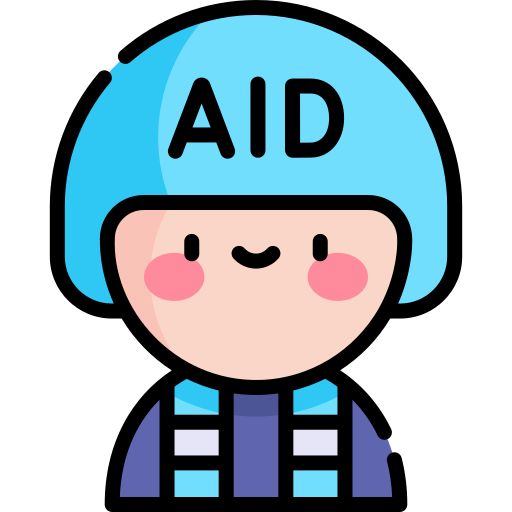 Intergovernmental Organizations
Intergovernmental Organizations
These consist of many countries which come together with a purpose or goal, whether for defense, development, or everything in between.
Examples include:
United Nations: The most important international forum, where every country meets to discuss and solve issues.
World Bank: They provide loans and funds to developing countries.
North Atlantic Treaty Organization: An alliance composed of the United States, Canada, and many European countries.
 Academia
Academia
University professors conduct original research and scholarship. They teach and advise students and often share their expertise with the news and government.
Examples of subjects:
International Relations
Security Studies
Political Science
Public Policy
History
Anthropology
Economics
Energy and Environmental Studies
 Think Tanks
Think Tanks
Similar to universities, these organizations analyze and sometimes advocate for different policies. Think tank scholars write reports, draft op-eds, and offer expertise.
Examples of think tanks:
 Journalism
Journalism
Many journalists and reporters document and cover global events, from wars and trade disputes to the internal politics of other countries.
Here are examples of some noteworthy outlets that you should check out to keep up to date with global news:
 Contracting and Consulting
Contracting and Consulting
The government often consults and works with businesses that do everything from developing weapons to assessing foreign aid programs. Other companies will hire organizations to analyze geopolitically sensitive industries, like energy.
Take Action
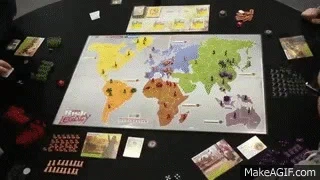
Foreign affairs is a competitive field to get into. But don't fret! Focus on the things you're passionate about and learn from the experience of others.
Your feedback matters to us.
This Byte helped me better understand the topic.
